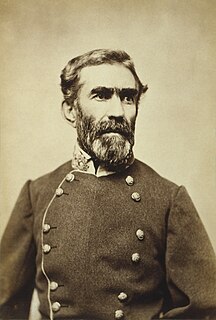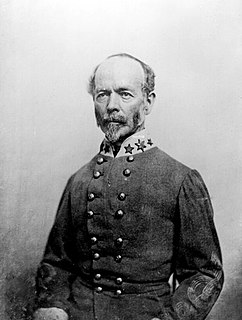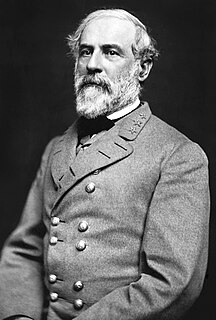 W
WPierre Gustave Toutant-Beauregard was a Confederate general officer who started the American Civil War by leading the attack on Fort Sumter on April 12, 1861. Today, he is commonly referred to as P. G. T. Beauregard, but he rarely used his first name as an adult. He signed correspondence as G. T. Beauregard.
 W
WBraxton Bragg was an American army officer during the Second Seminole War and Mexican–American War and later a Confederate army officer who served as a general in the Confederate Army during the American Civil War, serving in the Western Theater. His most important role was as commander of the Army of Mississippi, later renamed the Army of Tennessee, from June 1862 until December 1863.
 W
WSamuel Cooper was a career United States Army staff officer, serving during the Second Seminole War and the Mexican–American War. Although little-known today, Cooper was also the highest-ranking Confederate general during the American Civil War. After the conflict, he remained in Virginia as a farmer.
 W
WAlbert Sidney Johnston served as a general in three different armies: the Texian Army, the United States Army, and the Confederate States Army. He saw extensive combat during his 34-year military career, fighting actions in the Black Hawk War, the Texas War of Independence, the Mexican–American War, the Utah War, and the American Civil War.
 W
WJoseph Eggleston Johnston was an American career army officer, serving with distinction in the United States Army during the Mexican–American War (1846–1848), and Seminole Wars. After Virginia seceded from the Union, he entered the Confederate States Army as one of its most senior general officers.
 W
WRobert Edward Lee was an American Confederate general best known as a commander of the Confederate States Army during the American Civil War. He commanded the Army of Northern Virginia from 1862 until its surrender in 1865 and earned a reputation as a skilled tactician.
 W
WEdmund Kirby Smith was a career United States Army officer who fought in the Mexican–American War. He later joined the Confederate States Army in the Civil War, and was promoted to general in the first months of the war. He was notable for his command of the Trans-Mississippi Department after the fall of Vicksburg to the United States